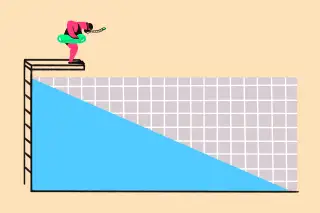How Freaked Out You Should be About a Recession, According to a Nobel Prize Winning Economist

Money recently launched Dollar Scholar, a new personal finance newsletter written by a 27-year-old who’s still figuring it out: me.
Every week, I’ll talk to experts about a money question I have, whether that’s “Are online banks sketchy? or “How many credit cards do I need?” As I learn, I’ll share simple ways to improve your financial life… and post some funny memes.
This is (part of) the eighth issue. Check it out below, then subscribe to get future editions of Dollar Scholar every Wednesday.
Where were you during the Great Recession of 2007-2009? I spent most of it in 10th grade. Being 15 years old, I was a lot more concerned with whether I was going to pass AP World History (I did) and what to wear to the homecoming dance (dress here) than the subprime mortgage crisis or Lehman Brothers. The recession was on my radar, but only vaguely so.
That's partially why, a decade later, I'm feeling unnerved by all the recent headlines predicting an impending recession. You know the ones — "Recession indicator with perfect track record flashing red," "Bond markets are sending one big global recession warning," "The world's biggest economies are facing a synchronized global slump," etc. It's been particularly bad ever since the yield curve, a thing I previously did not know existed, inverted last month.
Because I don't have any history with recessions, it's hard for me to gauge how alarmed I should be by these stories. And I'm not the only one who's confused and panicky. A quick look at Twitter shows most people my age are channeling their fear into dark jokes and recession memes.
I decided to cope by writing Dollar Scholar. So, should I be freaking out about a recession? What would it mean for me? How can I prepare?
I contacted Robert Shiller, a Yale University professor who won the 2013 Nobel Prize in economics, to get some context. (Casual.) In an email, he pointed to a remark economist Alfred Marshall made over a century ago: Economics is not an exact science.
"Recessions are hard to predict," Shiller adds. "Leading indicators that once worked to predict recessions may not work this time."
Take the yield curve, for example, which I learned reflects how investors are feeling about Treasury bond yields at any given time. Though it has previously seemed to be a good recession forecaster, Shiller noted that "the Fed was aggressively tightening to offset out-of-control inflation" in those cases. The U.S. doesn't have that right now — he says "we are emerging from the long slow recovery after the world financial crisis."
Of course, the inverted yield curve isn't the only recession indicator floating around. As Fortune pointed out, the unemployment rate is looking pretty good at 3.7%. But auto sales aren't doing great, and housing starts, which track construction on new private homes, are falling.
A survey recently found that roughly three out of four economists expect the U.S. to have a recession by 2021. But former Fed chairwoman Janet Yellen and President Donald Trump disagree.
For his part, Shiller told me he hopes experts start more closely examining the role of narratives in the economy going forward. As he put it in a 2017 paper, "Sometimes the dominant reason why a recession is severe is related to the prevalence and vividness of certain stories, not the purely economic feedback or multipliers that economists love to model." Whoa.
Because of this, it's hard to say what a recession would mean for me. But Shiller said not to spin out. And so did Katharine Perry, a certified financial planner at Fort Pitt Capital Group in Pennsylvania.
"This is not the end of the world. The sky is not falling," she says.
I was still feeling Chicken Littley, so I asked Perry how I should get ready for a recession. She told me that young people like me typically have two major concerns: retirement and debt.
As far as retirement goes, I should take a breath — it's a while off for most millennials, and any fluctuations due to a 2019/2020/2021 recession will even out by then. In fact, she said now is a good time to invest in my 401(k) because I'm getting more for my dollar.
For debt, Perry advised me to make sure things like my student loans and housing costs are paid down as much as possible. If a recession hits hard and I lose my job, I don't want to be buried in loan payments while scrambling to pay my bills.
Bottom line? A recession will come at some point, but I shouldn't freak out because it probably won't be exactly like the last one. There are a ton of factors at play... including the narratives that are currently worrying me so much.
In the meantime, it's smart to keep an eye on my retirement funds and try to clear up my debts. I should not, however, lock in my loss by panicking and selling off investments.
"Just ride it out," Perry says.